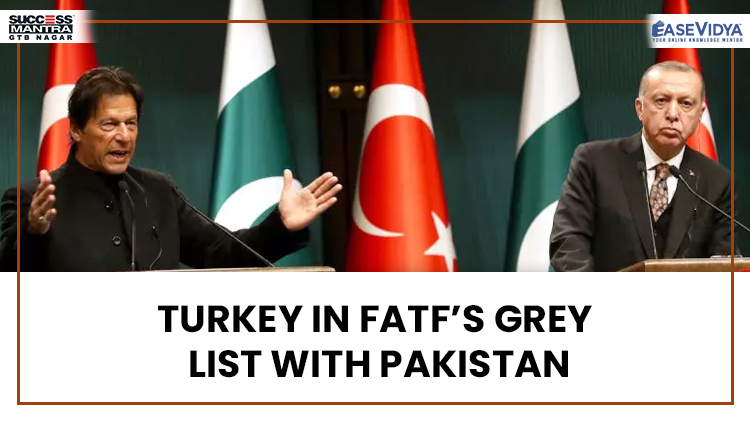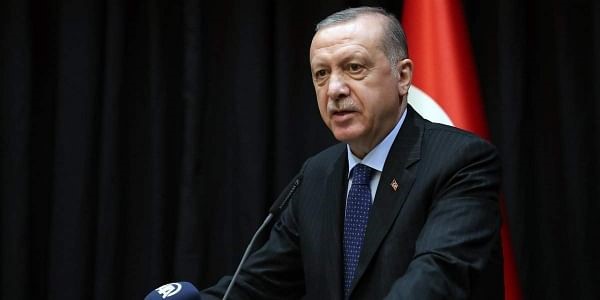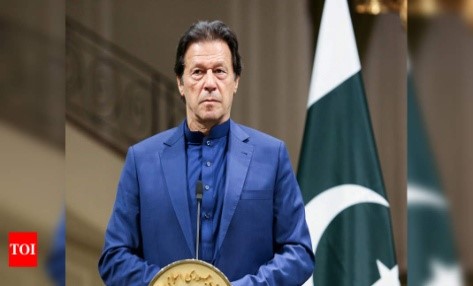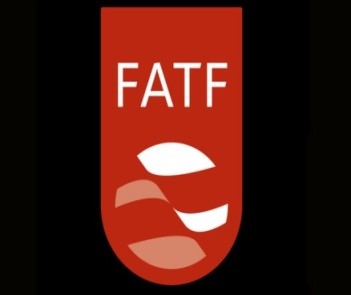
TURKEY IN FATF’S GREY LIST WITH PAKISTAN
TURKEY IN FATF’S GREY LIST WITH PAKISTAN
In a major blow to the two nations, the Financial Action Task Force (FATF) on October 21, 2021 placed Turkey on its grey list for failing to check terror financing and retained Pakistan as well. Overall, three countries were added to the grey list this time- Jordan, Mali and Turkey. The decision was announced at the conclusion of the FATF's three-day plenary session that was held to discuss key issues in the fight against terror financing and money laundering.

Current Affairs Notes By Success Mantra Coaching Institute GTB Nagar Delhi CLICK HERE
HOW LONG WILL PAKISTAN REMAIN FATF GREY LIST?
As per FATF President, Pakistan will remain on the grey list till it addresses all items on the original action plan agreed to in June 2018 along with all items on a parallel action plan handed out by the watchdog's regional partner - the Asia Pacific Group (APG) - in 2019. However, the FATF President noted that Pakistan has made significant progress this time as it has largely addressed 26 out of 27 items on the action plan it first committed to in June 2018. However, the remaining item on financial terrorism still needs to be addressed, which concerns the "investigation and prosecution of senior leaders and commanders of UN-designated terror groups".
HOW DOES ‘GREY LIST’ IMPACT COUNTRIES?
FATF grey list puts countries under the scanner for not implementing the objectives of the task force. With the entry of a country into the grey list, it can face intense scrutiny from FATF and its members.
Besides denting the country's image, the greylisting can impact a nation's economy as it would make it harder for foreign investors to do business in a country that is blamed for funding terror activities. Grey-listing of a nation lessens the investor's confidence in the country. Being placed on the FATF grey list also makes borrowing from international debt markets harder and costlier, as it reduces the nation's credibility.
Pakistan is retained for failing to effectively implement the global FATF standards and over its lack of progress on investigation and prosecution of senior leaders and commanders of UN-designated terror groups. Pakistan will remain on the grey list till it addresses all items on the original action plan agreed to in June 2018 as well as all items on a parallel action plan handed out by the FATF’s regional partner - the Asia Pacific Group (APG) - in 2019. The Pakistan government has two concurrent action plans, with a total of 34 action plan items. It has largely addressed 30 of the items. Pakistan has made significant progress and it has largely addressed 26 out of 27 items on the action plan it first committed to in June 2018. The item on financial terrorism still needed to be addressed. The 2019 action plan largely focussed on money laundering deficiencies. The FATF had advised that Pakistan should continue to work to address its six strategically important deficiencies, which included enhancing international cooperation by amending the money-laundering law and demonstrating that assistance was being sought from foreign countries in implementing the UNSCR 1373 designations. The UNSC Resolution 1373 was adopted on 28th September 2001. It declares international terrorism a threat to international peace and security and imposes binding obligations on all UN member states.
WHY HAS PAKISTAN BEEN RETAINED ON THE FATF GREY LIST?
Pakistan has been in the FATF grey list since June 2018 for deficiencies in its counter-terror financing and anti-money laundering regimes. Pakistan was retained on the grey list repeatedly for failing to effectively implement the global FATF standards. The nation has so far failed to meet the deadlines given to it to fulfill the conditions to get off the list. Pakistan was in June 2021 given three months to fulfill the remaining conditions by October. However, it has failed to address all the conditions within the given timeline.
Background: The FATF had issued the 27-point action plan after placing Pakistan on the ‘Grey List’ in June 2018. The action plan pertains to curbing money laundering and terror financing. Pakistan was first put on the list in 2008, removed in 2009 and then again remained under increased monitoring from 2012 to 2015. Pakistan's inclusion in the grey list has adversely impacted that country's prospects of obtaining financial assistance from world bodies such as the International Monetary Fund, World Bank, and Asia Development Bank.

FINANCIAL ACTION TASK FORCE
- About: An inter-governmental body established in 1989 during the G7 Summit in Paris. Assesses the strength of a country’s anti-money laundering and anti-terror financing frameworks, however it does not go by individual cases.
- Objectives: To set standards & promote effective implementation of legal, regulatory and operational measures for combating money laundering, terrorist financing and other related threats to the integrity of the international financial system.
- Headquarters: Its Secretariat is located at the Organisation for Economic Cooperation and Development (OECD) headquarters in Paris.
- Member Countries: The FATF currently has 39 members including two regional organisations - the European Commission and Gulf Cooperation Council. India is a member of the FATF.

LISTS UNDER FATF
- Grey List: Countries that are considered safe haven for supporting terror funding and money laundering are put in the FATF grey list. This inclusion serves as a warning to the country that it may enter the blacklist.
- Black List: Countries known as Non-Cooperative Countries or Territories (NCCTs) are put in the blacklist. These countries support terror funding and money laundering activities. The FATF revises the blacklist regularly, adding or deleting entries.
- Currently, Iran and Democratic People's Republic of Korea (DPRK) are under High-risk Jurisdiction or black list.
- Sessions: The FATF Plenary is the decision making body of the FATF. It meets three times per year.
PRAVAHINI Current Affairs Notes By Success Mantra Coaching Institute GTB Nagar Delhi CLICK HERE
TEST YOURSELF
Q.1 Which of the following countries have been added to the Financial Action Task Force (FATF)'s grey list along with Pakistan?
- Turkey, Jordan & Mali: ANSWER
- Jordan, Syria & China
- United Arab Emirates, Turkey, Kazakhstan
- None of the following
Q.2 Financial Action Task force is an inter-governmental body established in 1989 during the __________?
- G20 summit in Washington DC
- G8 summit in Moscow, Russia
- G7 summit in Paris: ANSWER
- None of the following
Q.3 Consider the given statements & state which of the following is/are incorrect in the reference to the above mentioned passage?
- Its Secretariat is located at the Organisation for Economic Cooperation and Development (OECD) headquarters in Geneva, Switzerland.
- The FATF currently has 39 members including two regional organisations - the European Commission and Gulf Cooperation Council.
- Only I follows: ANSWER
- Only II follows
- Both I & II follows
- None of the following
Q.4 Financial Action Task Force (FATF) decided to retain Pakistan on “increased monitoring list’. “Increased monitoring list” which is another name for the ___________?
- Black List
- Grey List: ANSWER
- Red List
- None of the following
Q.5 Which of the following is/are correct in the context of objectives of the Financial Action Task Force (FATF)?
- Combating money laundering
- Terrorist financing
- Preventing threats to the integrity of the international financial system.
- All of the above-mentioned: ANSWER












0 Comment